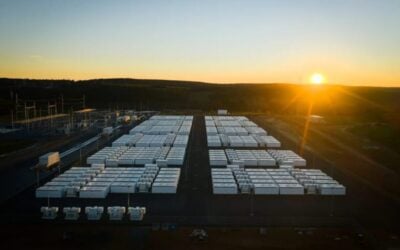Panasonic’s residential storage system launched to the Australian market. To give an idea of scale the system is just under 1.4 metres in height and just under a metre across. Image: Panasonic Australia.
While debates over renewable energy targets continue to rage at the political level in Australia, Panasonic has signed a deal with three utility companies to pair its energy storage systems with rooftop solar.
The electronics company, headquartered in Osaka, Japan, will see its residential lithium-ion (Li-ion) battery systems installed at the homes of existing rooftop solar customers for Red Energy, a subsidiary of electricity generator and retailer Snowy Hydro, Ergon Energy, owned by the government of Queensland and ActewAGL, which is described as Australia’s first multi-utility.
The Panasonic systems have an 8kWh usable capacity at 2kW output, meaning it can push out 2kW of energy for four hours. The trial programmes will test multiple use cases for the batteries, with the main one being for peak shaving- mitigating time of use charges for electricity in the evenings when usage peaks.
Panasonic says it hopes it can “provide a reliable, efficient base load for solar-installed households” and claims that based on the company’s own modelling, the amount of solar a household system owner can ‘self-consume’ onsite can be increased from 30% without storage to 60% with.
Try Premium for just $1
- Full premium access for the first month at only $1
- Converts to an annual rate after 30 days unless cancelled
- Cancel anytime during the trial period
Premium Benefits
- Expert industry analysis and interviews
- Digital access to PV Tech Power journal
- Exclusive event discounts
Or get the full Premium subscription right away
Or continue reading this article for free
In addition to this peak shaving aspect, the utilities will also trial using the storage systems for demand response- balancing electricity supply with demand through the grid, which can potentially have numerous advantages including reducing the need for infrastructure investment. Technical details of the trials have not yet been announced.
The battery systems are manufactured in Japan, but as regular followers of energy industry news will know, the company is Tesla’s manufacturing partner for battery packs at its Gigafactory in Nevada, which is still under construction. The Japanese company is trialling a number of its own approaches to the storage and solar markets, including preparing for Japan’s forthcoming energy market deregulation, recently showcasing a home system that allows users to ‘trade’ electricity, buying at the cheapest possible prices from the grid when necessary and selling excess home-generated PV power at the most attractive prices. An Australian company, Reposit Power, has notably started a scheme for electricity trading, called ‘Grid Credits’ recently, which Tesla, has also partnered with on a trial basis.
John Grimes, executive director of Australia’s Energy Storage Council, is a regular Guest Blogger for PV Tech Storage. In a recent post, Grimes argued that in spite of the anti-renewables stance exhibited by the government led by prime minister Tony Abbott, (whom Grimes compared to King Canute making a futile attempt to hold back the tide) the economics of solar, especially when paired with storage, remain attractive in Australia.





